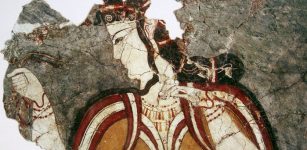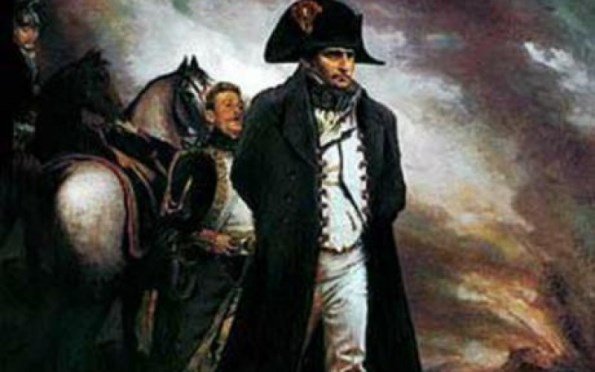Why Was Napoleon Bonaparte Defeated At Waterloo?
AncientPages.com - Napoleon Bonaparte (1769-1821) was undoubtedly one of the greatest military leaders of all time. He led several successful campaigns during the French Revolutionary and during his reign as an emperor he conquered most of Europe with an array of insightful tactics.
Being a military genius, Bonaparte was responsible for turning France into a superpower.
The Emperor Napoleon at Waterloo.
However, there were times when even the great Bonaparte was defeated. He sometimes had a tendency to underestimate his enemy. He was overconfident and this attitude led that he was occasionally defeated. For example, Napoleon’s invasion of Russia was a fiasco because he underestimated the cunning strategy of Tsar Alexander I. Napoleon also did not consider the cold Russian winters.
Bonaparte’s failure in Russia was the beginning of his downfall and the rise of Russia’s status as a leading power in post-Napoleonic Europe.
Battle At Waterloo
Napoleon’s Battle at Waterloo, Belgium is a famous military encounter, but it’s also a battle that went completely against him and his forces. The battle was between, France on side and Great Britain, Prussia and their allies on the other. The battle was a great victory for the British and the Prussians and it is widely seen as the end of the series of wars that had ravaged Europe since the French Revolution (1789).
See also:
Napoleon Bonaparte Dies In Exile On The Island Of Saint Helena – On May 5, 1821
Island Of St. Helena – Last Residence Of Napoleon Discovered – On May 21, 1502
Napoleon Bonaparte Dies In Exile On The Island Of Saint Helena – On May 5, 1821
The Battle at Waterloo was fought on June 18, 1815. It was the first and last encounter between two great military leaders – Napoleon Bonaparte and Duke of Wellington. The main reason why Bonaparte lost the battle against the Englishmen was because he had insufficient knowledge about his enemy.
Napoleon Bonaparte entered the Battle of Waterloo confident that his army would fully defeat Duke of Wellington.
The French Emperor had not received information about Wellington’s new, clever military strategy. Bonaparte completely underestimated Duke of Wellington and the allied forces.
Bonaparte Underestimated Duke of Wellington And the Allied Forces
Duke of Wellington had a cunning plan. He established a strong defensive position on a ridge and had fortified some farmhouses in the area, to protect his flanks.
Bonaparte followed an old-fashioned strategy and he was unprepared for Wellington’s deadly surprise.
On the afternoon, Bonaparte ordered his forces to attack the British and their allies before the Prussians arrived. He decided to attack the British the day after arriving at Waterloo.
When the French forces carried out the attack, they were taken by surprise by British soldiers who had been hiding behind a hill. The Battle at Waterloo turned into a bloodbath. More and more allied forces joined the battle and there was no way Bonaparte could win.
Waterloo cost the British army around 14,500 dead or wounded and the Prussians under Blücher suffered some 7,200 casualties. The French army had some 25,000 to 26,000 killed or wounded. Some 6000 to 7000 French soldiers were taken prisoner and another 15,000 men deserted. Waterloo was a decisive victory for the allies.
Napoleon’s army was no longer an organized fighting force and the British and Prussians were about to invade France, which was practically defenseless.
Waterloo ended the career of Napoleon one of the greatest generals in history. It also ended the last serious attempt by France to dominate Europe.
AncientPages
More From Ancient Pages
-
 Joseph Pujol – The Professional Farter Who Entertained People
Featured Stories | Jan 29, 2020
Joseph Pujol – The Professional Farter Who Entertained People
Featured Stories | Jan 29, 2020 -
 Raven Mocker And Cannibal Body Snatchers In Cherokee Mythology
Featured Stories | Jun 13, 2019
Raven Mocker And Cannibal Body Snatchers In Cherokee Mythology
Featured Stories | Jun 13, 2019 -
 Jurassic Sea Creature Unearthed In A Quarry Near Peterborough, UK
News | Dec 14, 2023
Jurassic Sea Creature Unearthed In A Quarry Near Peterborough, UK
News | Dec 14, 2023 -
 Colonnaded Hall Decorated With Captivating Frescoes Unearthed At Pompeii
Archaeology | Dec 30, 2024
Colonnaded Hall Decorated With Captivating Frescoes Unearthed At Pompeii
Archaeology | Dec 30, 2024 -
 Keshwa Chaca – Last Suspension Rope Bridge Of Inca People
Ancient Traditions And Customs | Apr 17, 2019
Keshwa Chaca – Last Suspension Rope Bridge Of Inca People
Ancient Traditions And Customs | Apr 17, 2019 -
 Ancient Peru’s Cranial Surgeons Had Remarkable Skills
Ancient Technology | Jun 8, 2018
Ancient Peru’s Cranial Surgeons Had Remarkable Skills
Ancient Technology | Jun 8, 2018 -
 Unique 2,000-Year-Old Hexagonal-Shaped Bronze Matrix Of Sarmizegetusa Regia, Romania
Artifacts | Jan 7, 2016
Unique 2,000-Year-Old Hexagonal-Shaped Bronze Matrix Of Sarmizegetusa Regia, Romania
Artifacts | Jan 7, 2016 -
 Utiseta – Norse Vision Quest – Ancient Spiritual Tradition Of Northern Europe
Ancient Mysteries | Oct 3, 2019
Utiseta – Norse Vision Quest – Ancient Spiritual Tradition Of Northern Europe
Ancient Mysteries | Oct 3, 2019 -
 A 900-Year-Old Crusader Sword Discovered Off The HaCarmel Coast, Israel
Archaeology | Oct 20, 2021
A 900-Year-Old Crusader Sword Discovered Off The HaCarmel Coast, Israel
Archaeology | Oct 20, 2021 -
 Remarkable Man-Made Underwater Structures Could Rewrite History Of Wisconsin
Featured Stories | Aug 22, 2018
Remarkable Man-Made Underwater Structures Could Rewrite History Of Wisconsin
Featured Stories | Aug 22, 2018 -
 Ignored Archaeological Discovery At Puma Punku That Could Re-Write Ancient History
Ancient Mysteries | May 11, 2020
Ignored Archaeological Discovery At Puma Punku That Could Re-Write Ancient History
Ancient Mysteries | May 11, 2020 -
 Neanderthals Had Capacity To Speak And Understand Language Like Humans
Archaeology | Mar 2, 2021
Neanderthals Had Capacity To Speak And Understand Language Like Humans
Archaeology | Mar 2, 2021 -
 Gruesome Discovery Of Headless Bodies In Vráble, Slovakia – Remains Of Stone Age Cult Victims Unearthed
Archaeology | Sep 24, 2022
Gruesome Discovery Of Headless Bodies In Vráble, Slovakia – Remains Of Stone Age Cult Victims Unearthed
Archaeology | Sep 24, 2022 -
 Ancient Petroglyph Code Cracked By Archaeological Explorers
News | Apr 10, 2020
Ancient Petroglyph Code Cracked By Archaeological Explorers
News | Apr 10, 2020 -
 This Is The Mysterious Hilltop Where Civilization Began Scientists Say
Archaeology | Jun 24, 2022
This Is The Mysterious Hilltop Where Civilization Began Scientists Say
Archaeology | Jun 24, 2022 -
 King Offa Of Mercia And The Murder Of King Ethelbert – Revenge Or Jealousy?
Featured Stories | Jul 19, 2018
King Offa Of Mercia And The Murder Of King Ethelbert – Revenge Or Jealousy?
Featured Stories | Jul 19, 2018 -
 Oldest Known Evidence Of Artificial Cranial Deformation Revealed In Croatia
Archaeology | Aug 26, 2019
Oldest Known Evidence Of Artificial Cranial Deformation Revealed In Croatia
Archaeology | Aug 26, 2019 -
 Dropa Stones: Did A 12,000 Year-Old Extraterrestrial Spaceship Crash On Earth?
Ancient Mysteries | Oct 2, 2015
Dropa Stones: Did A 12,000 Year-Old Extraterrestrial Spaceship Crash On Earth?
Ancient Mysteries | Oct 2, 2015 -
 Never-Before-Seen 3,000-Year-Old Paintings Of Egyptian Goddess Amentet Discovered Inside Coffin Of A Mummy
News | Apr 7, 2020
Never-Before-Seen 3,000-Year-Old Paintings Of Egyptian Goddess Amentet Discovered Inside Coffin Of A Mummy
News | Apr 7, 2020 -
 Genetic Mystery Solved: Ancient DNA Reveals Greeks Descended From The Minoans And The Mycenaeans
Archaeology | Aug 4, 2017
Genetic Mystery Solved: Ancient DNA Reveals Greeks Descended From The Minoans And The Mycenaeans
Archaeology | Aug 4, 2017


